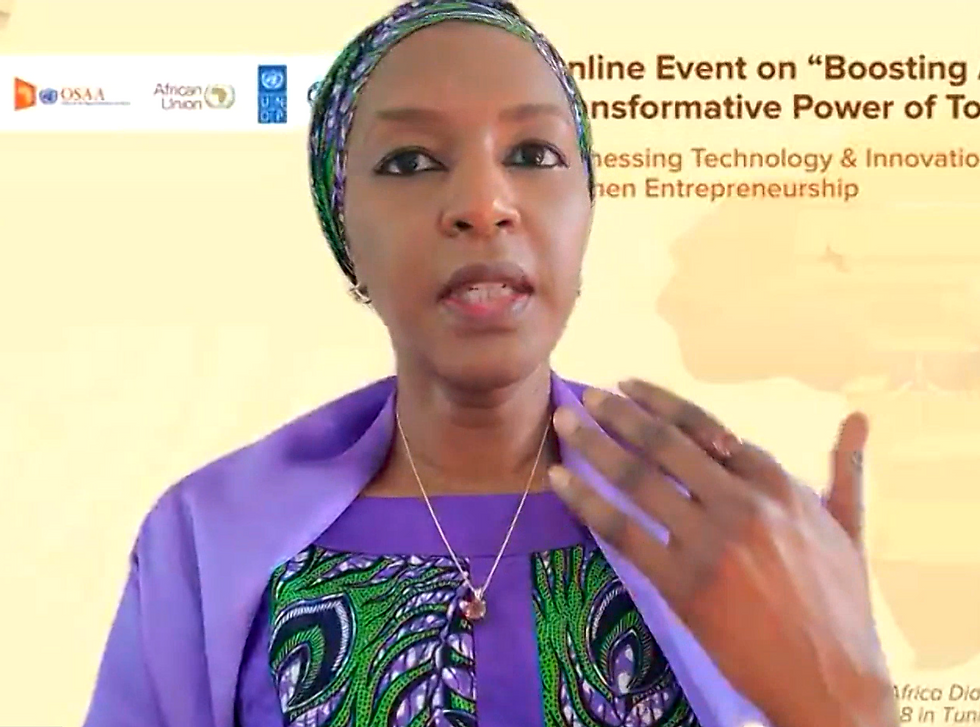BOOSTING AFRICA’S TRANSFORMATIVE POWER OF TOURISM
- AUMISSIONNY

- Jun 22, 2021
- 3 min read
Boosting Africa’s Transformative Power of Tourism
Harnessing Technology & Innovation, Youth & Women Entrepreneurship
Building Towards TICAD 8 in Tunis, 2022
21 June, 2021
Virtual Meeting on Zoom
Delivered by:
H.E Ambassador Fatima Kyari Mohammed,
Permanent Observer Mission to the African Union

Excellencies, distinguished guests, ladies, and gentlemen,
It is an honor to be with you here today, to reimagine the future of tourism in Africa after the pandemic.
Let me begin by thanking the Permanent Mission Japan, Permanent Mission of Tunisia, OSAA, UNDP and the WB for their partnership and efforts in organizing this event.
It is a pleasure to see all of us remerging from one of the worst pandemics in history. We also remember those we have lost. The year 2020 was indeed a watershed moment. Our economic and health institutions, and our way of life had been severely impacted.
Tourism was among the most affected industries, as countries limited international travel to curb Covid-19. Just before the pandemic, Africa had the second-fastest-growing tourism industry in the world. Over 20 million jobs were created while accounting for 8.4 percent of the Continent’s GDP. As the pandemic ruined the global economy and livelihood, the progress made, and the gains achieved in tourism, have been significantly diminished.
The number of international tourists to Africa fell by 98 percent by June 2020. Likewise, tourism-dependent sectors including airline and hotel, which employ a greater majority of women and youth, also plunged in ways unimaginable. As a result, that decline reversed the economic equality milestone in the African workforce.
There’s no doubt that the aftermath of this crisis highlights some critical questions: what do we need to bring back the jobs we have lost in tourism?; how do we start from here to build back better?
Well! We may not have direct answers, but I believe there is one thing these questions presents opportunities!
I am fully convinced that as the Continent, we have what it takes to build back better. The cradle of ancient innovations and human history are interwoven in Africa’s nature and cultural heritage. One cannot mention tourism without mentioning Africa.
From the pyramids to the majestic mountains and waterfalls, to the beautiful beaches and abundant wildlife; Africa has a huge potential in its tourism industry.
And to unlock this potential, we have no choice but to modernize our value-chain systems, to reflect the needs of the 21st century. As numerous researchers suggest, education, technological innovations, and digitalization accompanied with the most youthful workforce in the world can transform Africa’s tourism potential into countless economic opportunities.
Over half of the global population now interacts through digital communications. This underscores the need to increase digitization of input, processes, and output of tourism services.
Despite limited technological infrastructure, African innovators have been among the global pioneers in technology, extending the frontiers of digital financial services. Transforming African tourism through technology requires sound policies to empower African innovators by addressing skills, financial, and infrastructure gaps. Successful investment in technology, and skills development, will enable the creation of digital platforms, one of the most powerful engines for youth and women entrepreneurship. (Japan’s expertise in digital technologies has played a major role in transforming the electronic industry in the world. This experience will be absolutely beneficial, in reimagining African tourism in the digital era).
If there is one lesson that the Covid-19 crisis taught us, its that no nation or region can successfully navigate through this era without strong alliances. Our efforts to build back better stand on the threshold of multilateral cooperation. I applaud TICAD for striving to make this truth a reality. I am confident that the Tunis Conference next year will galvanize global support on these efforts.
In the same vein, rebuilding our tourism industry calls for stronger regional integration. Now that the African Continental Free Trade Area (AfCFTA) is now operational. Tapping on this largest trade agreement in the world would boost both domestic and international tourism in Africa. This will translate into more demand for products and services in tourism and other related industries. African Continental Free Trade Area (AfCFTA), the world’s largest free trade area by the number of participating countries, are among the pillars seen supporting the future growth of domestic and regional tourism in the continent.
Excellencies, distinguished guests, ladies, and gentlemen,
Let me conclude by stressing that tourism is one of the most plausible pathways for Africa to realize aspirations of the AU agenda 2063 as well as the “Sustainable Development Goals”. In particular, it will help advance SDG 1 “ending poverty in all its forms”; SDG 8 “decent work and employment”; SDG 9 “building resilient industry, technology, and infrastructure; and SDG 10 reducing inequalities.
As we strive towards these goals and the Africa We Want, let’s leverage technological innovations and digitalization to transform Africa’s tourism; create decent jobs; reduce inequalities; minimize tourism’s carbon footprint and the effects of climate change.
Thank you for your kind attention!
Read: Press Release









Comments